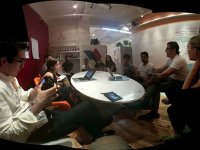Game-Based Learning in Practice
In early September, my sixth grade social studies students began playing the SimCityEDU beta. Around the same time, my seventh graders began playing a non-digital debate game -- complete with teams, a point system and a leaderboard. All of my students are rewarded for their growth and accomplishments with a digital badge system. After one month, I find that my students remain highly engaged in their learning. Gamifying my classroom has truly been transformative!
Non-Digital Games
I recently had the opportunity to visit the Institute of Play in New York City. The Institute mashes up game designers and teachers to "gamify" projects and lessons. One major takeaway I learned was how to use games for delivering instructional content.
Most of the games designed by the Institute of Play's Mission Lab are non-digital -- these games often involve cards, dice and/or gameboards. As part of the Institute of Play's Teacher Advisory Council, playfully known as the Octopus Pilots, I had the opportunity to "playtest" an "energetic discussion-based humanities game" called Socratic Smackdown. It was designed by Mission Lab, at Quest to Learn, in collaboration with Quest to Learn teacher Rebecca Grodner.
In Socratic Smackdown, students discuss content as gameplay. As the year progresses, we plan to play regularly, sometimes on the fly. Lately, students arrive to class asking, "Are we playing Socratic Smackdown today?" I look forward to asking students for ideas on how to mod (modify) the experience by adding multiple rounds or changing the timer settings.
Socratic Smackdown and Absolute Blast, a card-based math game, are due for release later this fall. Mission Lab expects to publish more games as well.
SimCityEDU
My students took part in the SimCityEDU pilot, from the Institute of Play's GlassLab. One of GlassLab's goals is to take content from "off-the-shelf" video games, which are frequently better designed than typical "drill and kill" educational games, and create lessons and assessments to drive learning. Many complex games have missions and levels that lend themselves to classroom learning. While I couldn't see students playing hours of Assassin’s Creed 3 in school, I could see some missions getting parsed out for teaching about the American Revolution. For example, "The Midnight Ride" mission (shown in the video below) lets players join Paul Revere's famous ride. GlassLabs designed SimCityEDU in conjunction with ETS, Pearson and Electronic Arts (EA), the producer of the original SimCity.
SimCityEDU is to be a series of games, with SimCityEDU: Pollution Challenge! as the first release. The game, which is focused on science standards, happened to fit the theme of community building in my social studies class. The goal of Pollution Challenge!, according to GlassLab, is for students to "play the role of mayor, [doing] the challenging work of addressing environmental impact while maintaining employment levels and citizen happiness." My students learned the mechanics quickly and improved as they "leveled up" in the challenges.
The beta version of Pollution Challenge! had a built-in leaderboard that aggregated student performance (points and badges). As a result, my students replayed missions to improve their learning. The final boss level had students apply all that they learned to overcome the hardest challenge.
Each mission ended with writing prompts and systems thinking tasks, which were essentially interactive, "mind map" activities. SimCityEDU's systems mapping tool included informational text and helped students reflect on how the game's mechanics related to their decision-making process.
The version of SimCityEDU we piloted was a beta version and did not have the full and final feature set that's anticipated for the general release in November. The launch will have that full set of features, including a teacher dashboard.
Badges, Feedback and Iteration
The first week of school, my students created an account on our virtual classroom's digital badge website. Badges are not used as grades, but rather as a "check along the way." There is an element of fun in badging. This system is designed to award intrinsic accomplishments and is not the focal part of the learning experience. My students helped develop some badges, including the "Proofreader Badge" for catching mistakes in handouts or websites, and the "Outside the Box Thinker Badge" for creative responses. Badges level up in difficulty to earn, from "Noob" to "Master." One student suggested a project where they get to design a series of badges that a historical figure would have won.
Feedback is an integral part of game-based learning. It provides my students with a chance on reflect on their learning. Conversely, their answers help me improve their learning experience.
I also had unintended success by posting leaderboards with total earned scores -- there was a spike in iteration with students redoing work so that they could do it better. Games enable my students to discover different ways of solving problems, which is more like life and less like standardized tests. For non-digital games like Socratic Smackdown, I use whiteboards to display individual and team scores. My next step is to "gamify" existing activities and team-based projects.
